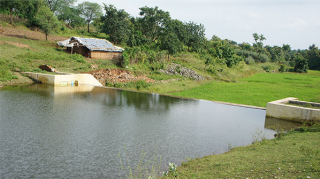Rainwater Harvesting System in India

Helping the farmers with Rainwater Harvesting techniques India is an agriculture-based country where 70% of the economy comes from the primary sector: farming. As intensive agriculture is spreading across India, there is an urgent need to encourage rainwater harvesting for irrigation. Nearly 60 % of farmers of the country depend on monsoons for agriculture due to the dearth of sustainable water resources. The erratic rain pattern was disturbing the livelihood of the cultivators. To address the issue a scientific water conversation technique named rainwater harvesting was introduced. What is Rainwater Harvesting? Rainwater harvesting is a technique where the rainwaters are collected into natural reservoirs, tanks or made to infiltrate the surface waters via subsurface aquifers. Rainwater harvesting is a simple easy and cost-effective technique that can be set up in open farming fields to collect and use the rainwater for irrigating crops. During the pas...